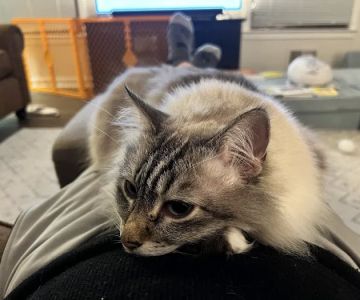- 1 - Why Is My Cat Licking Their Paws?
- 2 - Why Is My Cat Licking Their Lips Constantly?
- 3 - Behavioral Issues That Can Cause Licking
- 4 - Health Issues That Can Cause Excessive Licking
- 5 - How to Help Your Cat Stop Licking Their Paws and Lips
1. Why Is My Cat Licking Their Paws?
As a cat owner, you may have noticed your cat constantly licking their paws. While it’s normal for cats to groom themselves, excessive paw licking could indicate something else. Let's explore the reasons behind this behavior.
1.1 Normal Grooming Behavior
Cats are fastidious groomers, and licking their paws is a natural part of their grooming routine. However, if you notice your cat licking their paws far more often than usual, it could be a sign of something else.
1.2 Allergies
Allergies are a common cause of excessive paw licking in cats. Environmental allergies, such as pollen or dust mites, can cause irritation to your cat’s paws, prompting them to lick. Food allergies can also lead to similar behavior. If you suspect allergies, consult a veterinarian for proper diagnosis and treatment.
1.3 Fleas and Parasites
Fleas or other parasites can cause intense itching and discomfort, leading your cat to lick their paws excessively. Check for signs of fleas, such as flea dirt or small bumps on your cat's skin, and seek treatment if necessary.
2. Why Is My Cat Licking Their Lips Constantly?
In addition to paw licking, if your cat is licking their lips constantly, it could indicate a different set of causes. Let’s take a look at why cats may lick their lips so frequently.
2.1 Anxiety or Stress
Just like humans, cats can experience anxiety or stress, and lip licking is one of the ways they cope. Cats may lick their lips excessively when they feel nervous, such as during a visit to the vet, a change in their environment, or even due to a new pet in the house.
2.2 Nausea or Upset Stomach
Constant lip licking in cats can be a sign of nausea or an upset stomach. If your cat is feeling queasy or has digestive issues, they may lick their lips in response to the discomfort. Other signs of nausea include a lack of appetite, drooling, or a change in behavior.
2.3 Oral Health Problems
Dental issues, such as gum disease, tooth decay, or oral infections, can cause your cat to lick their lips frequently. Cats may try to alleviate pain or discomfort in their mouths by licking. If your cat’s behavior seems linked to oral pain, a vet visit is essential.
3. Behavioral Issues That Can Cause Licking
Sometimes, excessive licking, whether of the paws or lips, can be a behavioral issue. This might not be related to physical health problems but could instead reflect a behavioral pattern that requires attention.
3.1 Boredom
Boredom is a common cause of compulsive behaviors in cats, including excessive licking. If your cat isn’t getting enough mental stimulation or physical activity, they may resort to licking as a way to self-soothe or occupy themselves. Try increasing playtime and providing interactive toys to alleviate boredom.
3.2 Obsessive-Compulsive Disorder (OCD)
In rare cases, cats can develop obsessive-compulsive disorder (OCD), which can lead to excessive licking. This may occur due to stress or changes in routine. If the licking seems excessive or compulsive, a vet may recommend behavior modification or medication.
4. Health Issues That Can Cause Excessive Licking
It’s important to rule out potential health problems that could be causing your cat’s licking behavior. Some health conditions can trigger frequent licking, and addressing the underlying issue is key to resolving it.
4.1 Skin Infections or Irritations
Skin infections, fungal infections, or hot spots on your cat’s paws or face can lead to itching, causing your cat to lick excessively. Keep an eye out for redness, swelling, or scabs on the skin, and consult your vet if you suspect an infection.
4.2 Gastrointestinal Issues
As mentioned earlier, gastrointestinal issues like nausea or upset stomachs can also cause excessive licking. If your cat’s licking is accompanied by signs of digestive issues, such as vomiting or diarrhea, it may be time to schedule a vet appointment.
5. How to Help Your Cat Stop Licking Their Paws and Lips
Now that we understand why your cat may be licking their paws and lips constantly, let’s explore ways to help them stop this behavior.
5.1 Regular Vet Checkups
One of the most important steps is to ensure your cat is healthy by scheduling regular vet checkups. Your vet can rule out any medical issues, such as allergies, dental problems, or gastrointestinal issues, that could be causing the licking.
5.2 Provide Mental and Physical Stimulation
Ensure your cat gets plenty of playtime and mental stimulation. Interactive toys, scratching posts, and puzzle feeders can help prevent boredom and reduce compulsive behaviors like licking. Regular exercise will also keep your cat physically healthy.
5.3 Address Stress and Anxiety
If your cat is licking due to stress, try to identify and address the sources of anxiety. Creating a calm, consistent environment and using pheromone diffusers or sprays can help reduce stress. In some cases, medication prescribed by a vet may be necessary to manage anxiety.
If your cat’s behavior doesn’t improve or if you notice other worrying symptoms, don’t hesitate to seek help from your veterinarian. For expert care, visit Hidden Brook Veterinary for personalized advice and treatment options.











